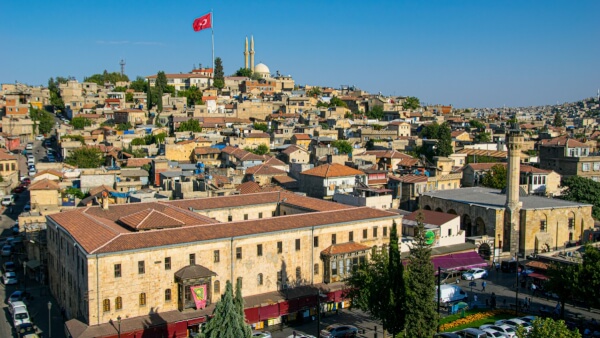What is the 'Nota Simple' in Spain and how do you get one?
Everything you need to know about the Nota Simple in Spain - an essential document for buying property - including how you can get it and how much it costs.

Planning to move to Egypt from the UK? One of your first priorities may be to buy a property. Or perhaps you’re looking to buy a holiday home or investment property in the country.
Whatever your plans, we’re to help - with an essential guide to buying property in Egypt as a foreigner.
Read on for info on starting your house hunt, mortgages in Egypt, taxes and fees for buyers, and the latest property prices in Egypt.
If you’re looking for ways to save money on currency exchange when buying property in Egypt, check out the money services provider Wise. You can send large transfers with Wise for low fees* and great exchange rates - making it ideal if you’re sending a secure international transfer.
Before you start your house hunt, it can be useful to know a little about how the process of buying property works in Egypt.
Here’s a quick overview of the steps involved:¹
The process of buying property in Egypt is quite different to the UK. So to make sure you get to grips with it and avoid any pitfalls, it’s a good idea to find and appoint a solicitor.
Look for someone who speaks both English and Egyptian, with experience in Egyptian property law and the local market. The GOV.UK website has a list of English-speaking lawyers in Egypt.
The next important step is to get your finances in order. You need to set your budget and organise the finance for your purchase (i.e. a mortgage with an Egyptian bank or refinancing a property with a UK bank to release funds).
You should also aim to define exactly what you’re looking for, focusing on the type of home, location and property price bracket.
To find your dream home, you can use online property portals and/or local estate agents to find properties. We’ll run through some tips later on how and where to start your search.
If you see something with potential, arrange a viewing as soon as you can, and start researching the area in the meantime.
If you’re considering making an offer on a property, it’s important to carry out some checks on it first. Have your solicitor verify the property’s legal status, ownership, claims, conditions and any other potential issues through a title search.
Once you’ve found your dream home, you can instruct your solicitor to make and offer and negotiate the terms of the purchase with the seller. Once everyone is happy and your solicitor has reviewed the purchase agreement carefully, both parties can sign it.
In Egypt, all property or land purchases must be approved by the government. So you’ll need to apply for clearance from the Council of Ministers. This is to check that the property isn’t in a restricted zone or is of strategic national or regional importance.
This is the time to finalise your mortgage or make other arrangements to finance your purchase. Payment terms and the schedule for payment will be agreed between both parties.
The final steps involve signing the final sales contract and arranging a transfer for the remaining balance. Your solicitor will register the transfer of ownership with the relevant authorities and make sure any taxes and/or fees are paid.
And then all that’s left is for you to pick up the keys to your new home.
| 💡 Read more: The best UK banks for sending money abroad |
|---|
Some Egyptian banks and providers offer mortgage loans to foreigners, such as Qatar National Bank (QNB). But not all do, so you may need to do some research to get an idea of your options.
You’re likely to find that a key requirement will be a residency visa and/or proof of address in Egypt. This means that getting a mortgage at an Egyptian bank as a non-resident might not be possible. So, you might need to wait until you’ve officially moved to Egypt.
The requirements for a mortgage application will vary between banks, but generally you’ll need to provide:
It’s not absolutely essential to have an Egyptian bank account or international account in order to get a mortgage, but it might make the process easier.
Alongside the property price, you also need to budget for the fees and taxes which may apply to your Egyptian property purchase.
Here are the essential costs you need to know about:²
You should also factor in estate agent fees (if not paid by the seller) and fees associated with your mortgage.

Egypt’s property market has experienced soaring prices in the last few years, with house prices in the first part of 2024 shooting up a whopping 39.3% compared to the previous year.³
This is despite some major economic turbulence in the country. Notably, the devaluation of the Egyptian pound (EGP) earlier in 2024 - the fourth devaluation in two years.
It has been suggested that Egyptians are investing in real estate despite its unaffordability, to gain some sort of stability in the face of currency and economic uncertainty.⁴
Yes, foreigners can buy property in Egypt, as long as they have a residence visa.
They can only buy residential property though, as the law doesn’t permit foreigners to own non-residential property or land earmarked for agriculture.⁵
There are also restrictions on foreign property ownership in some parts of the country, so you’ll need to check in the area you’re planning to buy in.
There’s no direct route to permanent residency through the purchase of property in Egypt.
In fact, you have to hold a residence visa in order to buy property in the country.⁵
Now for the important question - how much does property cost in Egypt?
The good news is that property prices are substantially cheaper in Egypt than in the UK. In fact, they could be around 90% to 92% cheaper per square metre, depending on whether you buy in or outside of a city centre.⁶
Although of course, it depends exactly where and what you buy.
To narrow it down a little further, here’s a guide to what you can expect to pay per square metre in a couple of Egypt’s major cities:⁷
| City | Average apartment price per sq.m - city centre | Average apartment price per sq.m - outside city |
|---|---|---|
| Cairo | 31,537 EGP | 19,547 EGP |
| Alexandria | 24,426 EGP | 16,006 EGP |
Remember though that property prices will also vary depending on the type of property.
Another thing to note when figuring out the price for property in Egypt is that international transfers could get expensive, especially if the provider adds a margin to the exchange rate to convert your pounds. Consider checking out Wise to securely handle your large transfers with mid-market exchange rates and low, transparent fees*.
If you’re property hunting on a budget, you might want to check out the property market in places like Aswan, Luxor, Hurghada and Marsa Alam.
All are known for relatively affordable property prices, compared to major cities like Cairo and Alexandria.
The two main routes to find property to buy in Egypt are local real estate agencies and online property websites.
It isn’t necessary to use a real estate agent to find a property to buy overseas. But it can be helpful, especially if you’re moving to Egypt from the UK and are unfamiliar with the local property market.
Estate agents in Egypt aren’t regulated like they are in some other countries, so you need to do thorough checks of any agents you’re dealing with via your solicitor.
You can also search for property in Egypt online, from the comfort of your current home in the UK.
Here are some popular local real estate websites to check out:

When buying property overseas, it’s important to be cautious and do all of your due diligence. You need to take all possible measures to protect yourself from scams and fraudsters.
The first issue to overcome is the language barrier. You’ll need to work with specialist agents and solicitors who speak both Egyptian and English.
Here are some other important things to be aware of:⁵
And of course, you should take all possible measures to protect yourself from scams and fraudsters.
Your search criteria will determine which is the right property for you. The most important factors will be location, the type of home and of course, how much you can afford to spend.
If you’re not already living there, it’s worth making a trip to the specific town or city in Egypt you’re interested in. You’ll want to check out the local area and view properties, making sure to pay attention to local transport links and amenities.
It’s a good idea to do as much research as possible before committing to purchase a property. A crucial step is checking the title deeds and land registry to ascertain the legal status of the property, as well as if any building conditions, charges or other restrictions are registered against it.
You might also want to commission a building survey or inspection, which will flag up any major issues and give you a better idea of what you’re buying.
Before you can get the keys to your new home, you’ll have a final few tasks to check off your list.
These include taking out insurance, setting up your utilities and carrying out any energy efficiency renovations.
It’s strongly recommended to take out a buildings insurance policy starting from your completion date.
If you know when your completion date will be, it makes sense to get some essentials set up in advance of moving in.
A prime example is utilities, such as heating, power and water. Get these sorted as early as you can, and the moving process should be a little smoother.
Purchased an Egyptian property with an older heating system or minimal insulation?
From heating and insulation upgrades to double glazing and draught proofing, there may be things you can do to improve the energy efficiency of your new home.
After reading our comprehensive guide to buying property in Egypt for foreigners, you should be all set to start house hunting.
We’ve covered all of the most important information, including how the buying process works in Egypt, average property prices, pitfalls to avoid and what fees and taxes are involved.
And, if you want to save money while buying your new property in Egypt, make sure to use the Wise account to send your international transfer. It’s not a bank account but offers many similar features.
Here are the main benefits for using Wise: |
|---|
|
Sources used:
Sources last checked on date: 29-Oct-2024
*Please see terms of use and product availability for your region or visit Wise fees and pricing for the most up to date pricing and fee information.
This publication is provided for general information purposes and does not constitute legal, tax or other professional advice from Wise Payments Limited or its subsidiaries and its affiliates, and it is not intended as a substitute for obtaining advice from a financial advisor or any other professional.
We make no representations, warranties or guarantees, whether expressed or implied, that the content in the publication is accurate, complete or up to date.

Everything you need to know about the Nota Simple in Spain - an essential document for buying property - including how you can get it and how much it costs.

Read our guide on how to transfer money to buy property overseas, including all of the best options for UK residents and steps to set up a large transfer.

Read our guide on how to transfer money to buy property in Spain, including all of the best options for UK residents and steps to set up a transfer.

Read our complete guide to selling your property in Barbados, including info on the process, fees, taxes, legal requirements and more.

Read our comprehensive guide to getting a mortgage in Turkey from the UK, covering everything you need to know.

Read our essential guide to property tax in Turkey for foreigners and UK expats, including taxes on buying, selling and renting out property.